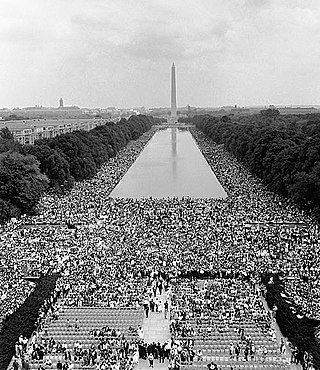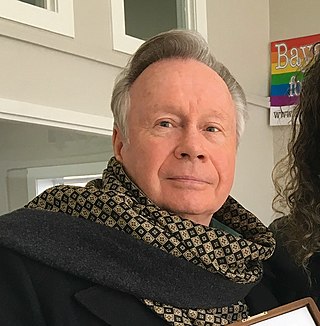
Bayard Rustin was an African American leader in social movements for civil rights, socialism, nonviolence, and gay rights.

The March on Washington for Jobs and Freedom, also known as simply the March on Washington or The Great March on Washington, was held in Washington, D.C., on August 28, 1963. The purpose of the march was to advocate for the civil and economic rights of African Americans. At the march, final speaker Dr. Martin Luther King Jr., standing in front of the Lincoln Memorial, delivered his historic "I Have a Dream" speech in which he called for an end to racism.

Kwame Ture was a prominent organizer in the civil rights movement in the United States and the global pan-African movement. Born in Trinidad, he grew up in the United States from the age of 11 and became an activist while attending the Bronx High School of Science. He was a key leader in the development of the Black Power movement, first while leading the Student Nonviolent Coordinating Committee (SNCC), then as the "Honorary Prime Minister" of the Black Panther Party (BPP), and last as a leader of the All-African People's Revolutionary Party (A-APRP).

Black studies, or Africana studies, is an interdisciplinary academic field that primarily focuses on the study of the history, culture, and politics of the peoples of the African diaspora and Africa. The field includes scholars of African-American, Afro-Canadian, Afro-Caribbean, Afro-Latino, Afro-European, Afro-Asian, African Australian, and African literature, history, politics, and religion as well as those from disciplines, such as sociology, anthropology, cultural studies, psychology, education, and many other disciplines within the humanities and social sciences including performance and art. The field also uses various types of research methods.
George Mills Houser was an American Methodist minister, civil rights activist, and activist for the independence of African nations. He served on the staff of the Fellowship of Reconciliation.
The White House Conference on Civil Rights was held June 1 and 2, 1966. The aim of the conference was built on the momentum of the Civil Rights Act of 1964 and the Voting Rights Act of 1965 in addressing discrimination against African-Americans. The four areas of discussion were housing, economic security, education, and the administration of justice.

The A. Philip Randolph Institute (APRI) is an organization for African-American trade unionists. APRI advocates social, labor, and economic change at the state and federal level, using legal and legislative means.

The Albert Shanker Institute (ASI) is a nonprofit, nonpartisan organization dedicated to three themes: excellence in public education, unions as advocates for quality, and freedom of association in the public life of democracies. Its mission is to generate ideas, foster candid exchanges, and promote constructive policy proposals related to these issues. Toward these ends, ASI conducts original research, sponsors research, and organizes conferences and conversations in its three theme areas.

The Journey of Reconciliation, also called "First Freedom Ride", was a form of nonviolent direct action to challenge state segregation laws on interstate buses in the Southern United States. Bayard Rustin and 18 other men and women were the early organizers of the two-week journey that began on April 9, 1947. The participants started their journey in Washington, D.C., traveled as far south as North Carolina, before returning to Washington, D.C.
Black Power is a political slogan and a name which is given to various associated ideologies which aim to achieve self-determination for black people. It is primarily, but not exclusively, used by black people activists and proponents of what the slogan entails in the United States. The Black Power movement was prominent in the late 1960s and early 1970s, emphasizing racial pride and the creation of black political and cultural institutions to nurture, promote and advance what was seen by proponents of the movement as being the collective interests and values of black Americans.
Steven Craig Harper is a professor of church history and doctrine at Brigham Young University. He was a historian for the Church History Department of the Church of Jesus Christ of Latter-day Saints. From 2019, he is the Editor-in-Chief of BYU Studies Quarterly.

Tom David Kahn was an American social democrat known for his leadership in several organizations. He was an activist and influential strategist in the Civil Rights Movement. He was a senior adviser and leader in the U.S. labor movement.
Abdul Alkalimat is an American professor of African-American studies and library and information science at the University of Illinois at Urbana–Champaign. He is the author of several books, including Introduction to Afro-American Studies (1984), The African American Experience in Cyberspace (2004), Malcolm X for Beginners (1990), and The History of Black Studies (2021). He curates two websites related to African-American history, "Malcolm X: A Research Site" and "eBlack Studies".

Walter Naegle is an American artist and photographer who is the surviving partner of late American Civil Rights leader Bayard Rustin, and the executive director of the Bayard Rustin Fund, which commemorates Rustin's life, values, and legacy. Naegle serves as board member emeritus at the Bayard Rustin Center for Social Justice, an LGBTQIA safe space, community activist center, and educational enclave in Princeton, New Jersey dedicated to honoring Bayard Rustin through their mission and good works.

Brother Outsider: The Life of Bayard Rustin is a 2003 American biographical documentary film co-produced and co-directed by Nancy Kates and Bennett Singer. The documentary tells the story of Bayard Rustin, the African-American civil rights activist, notable for his activism for racial equality, gay rights, socialist issues, and organizing the 1963 March on Washington. Appearing in footage and interviews are Rustin, A.J. Muste, David McReynolds, Bob Dylan, Martin Luther King, Malcolm X, Stokely Carmichael, Lyndon B. Johnson and Robert F. Kennedy. The film premiered on January 17, 2003 at the Sundance Film Festival and two days later on January 19 on POV. The film has received numerous awards and nominations at various festivals.
In the fall of 1965, A. Philip Randolph, Bayard Rustin and Dr. Martin Luther King Jr., prominent economists, allies from the labor movement, and others who had participated in the 1963 March on Washington began working on what they called "A Freedom Budget For All Americans". Writing 50 years later in The Nation, John Nichols listed as its goals "the abolition of poverty, guaranteed full employment, fair prices for farmers, fair wages for workers, housing and healthcare for all, the establishment of progressive tax, and fiscal policies that respected the needs of working families." Randolph worked with Bayard Rustin and King on the Freedom Budget document. He was determined to win the "full and final triumph of the civil rights movement, to be achieved by going beyond civil rights, linking the goal of racial justice with the goal of economic justice for all people in the United States" and doing so "by rallying massive segments of the 99% of the American people in a powerfully democratic and moral crusade."

Racial capitalism is a concept reframing the history of capitalism as grounded in the extraction of social and economic value from people of marginalized racial identities, typically from Black people. It was described by Cedric J. Robinson in his book Black Marxism: The Making of the Black Radical Tradition, published in 1983, which, in contrast to both his predecessors and successors, theorized that all capitalism is inherently racial capitalism, and racialism is present in all layers of capitalism's socioeconomic stratification. Jodi Melamed has summarized the concept, explaining that capitalism "can only accumulate by producing and moving through relations of severe inequality among human groups", and therefore, for capitalism to survive, it must exploit and prey upon the "unequal differentiation of human value."
Rustin is an upcoming American biographical drama film directed by George C. Wolfe from a screenplay he co-wrote with Dustin Lance Black. The film is produced by Barack and Michelle Obama's production company Higher Ground Productions. The story revolves around gay civil rights activist Bayard Rustin, who helped organized the 1963 March on Washington alongside Martin Luther King Jr.. It will be released on Netflix in 2023.
Joseph Fairchild Beam was an African-American gay rights activist, writer and poet.
Small organizations associated with the Socialist Party of America have served as schools for the leadership of social-movement organizations, including the civil rights movement and the sixties radicalism. These organizations are now chiefly remembered because of their members' leadership of large organizations that directly influenced the United States and international politics. After 1960, the party also functioned "as an educational organization" and "a caucus of policy advocates on the left wing of the Democratic Party".












